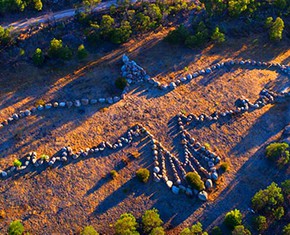The views expressed in our content reflect individual perspectives and do not represent the authoritative views of the Baha'i Faith.
Let’s take a look at the idea of dynamic interactions between this world and the next by reversing the perspective and asking this question: “Does the world beyond have any influence in this world?”
The answer, from a Baha’i perspective, is a resounding “Yes!” Here’s why – and how:
If it is true that thoughts are pure energy and there is no physical “distance” between thoughts, then there may be more interaction between the world beyond and this world than we might have previously thought. This interaction could take the form of subtle influences, or moments of sudden inspiration or insight or realization or discovery, that flow from the world above to this world below. The Baha’i teachings call this dynamic interplay “the conversation of the spirit,” although the conversation does not resemble a normal vocal one and may, in fact, be rather one-sided:
Question: “Can a departed soul converse with someone still on earth?”
Abdu’l-Baha – A conversation can be held, but not as our conversation. There is no doubt that the forces of the higher worlds interplay with the forces of this plane. The heart of man is open to inspiration; this is spiritual communication. As in a dream one talks with a friend while the mouth is silent, so is it in the conversation of the spirit. – Abdu’l-Baha, Paris Talks, p. 179.
In this kind of conversation, a departed soul imparts an idea into the heart of someone here on Earth. The sum total of such occurrences can be summed up in the idea that the souls in the hereafter can influence souls in the here-and-now. In this celebrated passage from the Baha’i writings, Baha’u’llah wrote:
Thou hast, moreover, asked Me concerning the state of the soul after its separation from the body. Know thou, of a truth, that if the soul of man hath walked in the ways of God, it will, assuredly, return and be gathered to the glory of the Beloved. By the righteousness of God! It shall attain a station such as no pen can depict, or tongue describe. The soul that hath remained faithful to the Cause of God, and stood unwaveringly firm in His Path shall, after his ascension, be possessed of such power that all the worlds which the Almighty hath created can benefit through him. Such a soul provideth, at the bidding of the Ideal King and Divine Educator, the pure leaven that leaveneth the world of being, and furnisheth the power through which the arts and wonders of the world are made manifest. Consider how meal needeth leaven to be leavened with. Those souls that are the symbols of detachment are the leaven of the world. Meditate on this, and be of the thankful. – Baha’u’llah, Gleanings from the Writings of Baha’u’llah, p. 161.
You get the picture. To put it rather crudely, this world is a lump of dough – and the influence of souls from the world beyond is the leaven! Abdu’l-Baha elaborated on this theme of spiritual influences and inspiration from the next world when he answered the question: “How should one look forward to death?”
How does one look forward to the goal of any journey? With hope and with expectation. It is even so with the end of this earthly journey. In the next world, man will find himself freed from many of the disabilities under which he now suffers. Those who have passed on through death, have a sphere of their own. It is not removed from ours; their work, the work of the Kingdom, is ours; but it is sanctified from what we call time and place. Time with us is measured by the sun. When there is no more sunrise, and no more sunset, that kind of time does not exist for man. Those who have ascended have different attributes from those who are still on earth, yet there is no real separation.
In prayer there is a mingling of station, a mingling of condition. Pray for them as they pray for you! When you do not know it, and are in a receptive attitude, they are able to make suggestions to you, if you are in difficulty. This sometimes happens in sleep. – Abdu’l-Baha, Abdu’l-Baha in London, pp. 95–96.
This highly significant idea – that “there is no real separation” between this world and the world beyond means that existence in the next world has a dimension independent of time and space. So the interaction between the two worlds must be a kind of synchronicity, sympathetic in nature and modality, in which communication is mediated through inspired dreams (as distinguished from dreams that are purely the product of our imagination) or through pure thought. Such subtle inspiration and sudden insights can come in many forms – such as solutions to personal problems, useful insights, artistic ideas, and scientific discoveries.
However – receptivity on the part of the person here on Earth is required in order to benefit from such influence from the next world. Without such receptivity, the message cannot be delivered. Earnest prayers can help cultivate that subtle, spiritual susceptibility of heart and soul.
These Baha’i teachings about the spiritual influence of the next world in this world can be summed up like this: “Heaven is leaven.” In this sense, heaven and Earth are interconnected, interrelated, and interactive. The influences from the world beyond are subtle, yet potentially significant in every aspect of our lives.
In closing, here is a Baha’i prayer, to be recited at midnight, that may increase your own receptivity to inspired ideas from the world beyond:
O seeker of Truth! If thou desirest that God may open thine eye, thou must supplicate unto God, pray to and commune with Him at midnight, saying:
O Lord, I have turned my face unto Thy kingdom of oneness and am immersed in the sea of Thy mercy. O Lord, enlighten my sight by beholding Thy lights in this dark night, and make me happy by the wine of Thy love in this wonderful age. O Lord, make me hear Thy call, and open before my face the doors of Thy heaven, so that I may see the light of Thy glory and become attracted to Thy beauty.
Verily, Thou art the Giver, the Generous, the Merciful, the Forgiving. – Abdu’l-Baha, Baha’i Prayers, pp. 61–62.
Dedicated to the loving memory of Sandra Kay (Thompson) Buck (September 4, 1928–April 24, 1991) and George Hugh Buck (March 10, 1926–May 10, 2010), my parents, in perpetual honor: “Gratitude urges us to repay kindness; justice disposes us to do what is right; kindness moves us to act graciously; humanity constrains us to show mercy.” – John Page Hopps, First Principles of Religion and Morality (1874), p. 22.
You May Also Like
Comments

















He, verily, hath willed for you that which is yet beyond your knowledge, but which shall
be known to you when, after this fleeting life, your souls soar heavenwards and the
trappings of your earthly joys are folded up.
Bahá’u’lláh, The Kitab-i-Aqdas, p. 55
The mysteries of man’s physical death and of his return have not been divulged, and still
remain unread
Baha’u’llah, Gleanings from ...the Writings of Baha’u’llah, p. 345
(Baha'u'llah, The Hidden Words, Persian no. 19)